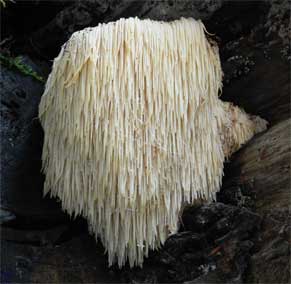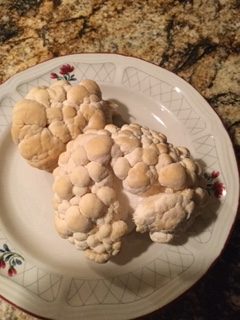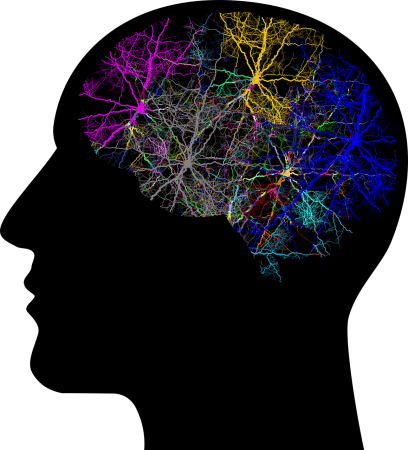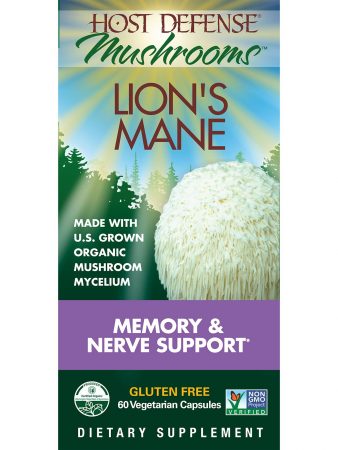Lions Mane Mushrooms
For Anxiety, Depression and Brain Function
There are numerous medicinal mushrooms, and each has its unique health benefits. This post will look at the benefits of Lions Mane mushrooms for mental health and brain health.
Lions mane mushrooms are white global shaped fungi with a long shaggy spine, hence its name. It is often used in traditional Chinese medicine and is native to the southern regions of North America, Europe and Asia. (5) It grows on dead and decaying hardwood trees (7).
It was traditionally used in Chinese medicine for stomach and digestive problems. It was also used for immune support and for its anti-bacterial and anti-inflammatory properties. But it is Lions Mane effects on the brain that truly distinguish it from other medicinal mushrooms. (7)
You can eat them or take them as supplement form or in tea form. They aren’t found in most grocery stores, but I was able to find them at Whole Foods and sometimes I can find them at Farmers Markets. However, what was labeled as Lions Mane at Whole Foods didn’t quite look like Lions Mane that I have seen in pictures-it did not have that shagginess to it so not sure if it even was lion’s mane. If you are not sure if it is lion’s mane and are using it for medicinal purposes, it is probably best to source it in supplement form from a reputable brand.
(This is what the lions mane from Whole Foods looked like-not quite what the other pics looked like)
Lions Mane for Depression and Anxiety
Lions mane contains two compounds, called hericenones and erinacines, which have neuroprotective and cognitive enhancing effects. Some studies suggest that lion’s mane boosts proteins that are needed for growth, maintenance and survival of neurons.
It has been shown to be useful in addressing depression and anxiety. (4) It is believed that lions mane compounds can stimulate nerve growth factor and impact your autonomic nervous system (6) Your autonomic nervous system is divided into three parts, the sympathetic nervous system (flight or fright), the parasympathetic nervous system (rest and relax) and the enteric nervous system (stretches across the digestive system and is known as the second brain).
In a 2015 study on mice, lion’s mane extract, decreased depression (1). In another study it contributed to reduced inflammation. (2) In a Japanese study done on females with PMS symptoms it was reported that when taking lions mane for 4 weeks, these women had improved sleep, and reported less anxiety and less irritability than the placebo group. (3)
It is not only useful for anxiety and depression, but can also improve memory, boost creativity and help with concentration, thus may be useful for those with ADD as well. (5)
What is fascinating about lions mane, is that it has the ability to repair and regenerate neurons in the body thus able to improve overall cognitive function.
Benefits of Lions Mane
- Improves cognition, memory
- Good for heart health
- Antioxidant rich
- Increased immune function
- Can reduce anxiety and depression, improve mood
- Cancer supportive
- Good for diabetics
- Digestive properties
- Wound healing benefits
- Good for the nervous system
- Supports a healthy metabolism
- Supports energy levels
- Useful for dementia, Parkinson’s
- Good to use for Head injury recovery
(4, 7)
Your Blood Brain Barrier
Your blood brain barrier (BBB) is an internal filtering system whose purpose is to protect the central nervous system by filtering out foreign compounds before they enter the brain. Your BBB is not permeable by Nerve Growth Factor (NGF) proteins which are too big to pass through the BBB. (NGF proteins protect existing neurons and stimulate nerve growth). If your brain makes enough NGF then you dont need to worry, but if it is not, the neurons in your brain will not survive and new neurons will not be produced. When the brain does not make NGF it can lead to disease, cognitive loss and impact on brain health and function. (7)
This is where Lions Mane plays a role. It has the ability to stimulate NGF. The compounds in lions mane can stimulate the brain to make more NGF within the brain. (7)
How To Use Lions Mane
I like to add them in when I can find them as food to my diet but if you want to use lion’s mane for a targeted reason such as for anxiety or depression, consuming the tea daily three times per day or in supplement form is best.
As a supplement is it considered a nootropic without side effects. What that means is that it can enhance mental acuity without any negative side effects. (5)
- Lightly sauté in butter or avocado oil. It has a seafood like quality to its flavor making it useful in a wide variety of dishes.
- Drink as a tea (Four Sigmatic brand makes a Lions Mane mushroom elixir mix.)
- Take as a supplement (Host Defense brand capsules) You can also find it in powder form. Two other sources for quality medicinal mushroom supplements are www.mushroomscience.com and www.mushroomwisdom.com
- Extract: Host Defense is a reputable mushroom supplement company that sells it in a liquid extract as well. (see above for other sites/brands as well)
- Take 1500 to 3000 mg. per day and give it time to see effects (around 6 to 8 weeks). Lions mane is best taken at lunch time. (7).
Interactions
Lions Mane is a food, a fungi, so there are no interactions with other supplements and medications but still if on meds just talk to your health care professional if adding this in as a supplement. In studies on rodents, high doses did not produce any adverse effects.
Bottom Line
If you have anxiety and/or depression, it may be worth a try to add in lion’s mane to your daily regimen. It cannot hurt and not only can it help with your mood, but it can also help with other aspects of your health as well.
BUT if you have depression or anxiety, please note that just Lion’s mane in the diet or as a supplement may only help minimally. I have gotten calls from prospective clients reading this post and adding in Lion’s Mane but still are not ready to address root causes. You need to do more than only adding in one supplement and one food into the diet-root causes! And Lion’s mane may be helpful for you but not for the next person-we are all individuals!
If you are on any medications, it is still best to discuss Lions mane with your health care professional. As a general rule, it is best to take supplements at least two hours away from your medications.
If you need more support and help for your depression or anxiety and are ready to get started at making changes and addressing root causes, give me a call to set up a consult. 303-522-0381 or karen@trufoodsnutrition.com
Sources
- https://www.ncbi.nlm.nih.gov/pupbmed/26150007
- https://www.ncbi.nlm.nih.gov/pmc/articles/ /
- https://www.jstage.go.jp/article/biomedres/31/4/31_4_231/_PDF/char/en
- Turner, L. The Ultimate Adaptogen Guide. Better Nutrition Magazine, Feb. 2019
- https://www.herbexaminer.com/mushrooms/lions-mane-mushroom-great-for-anxiety-memory%E2%80%8A/
- https://www.ncbi.nlm.nih.gov/pubmed/20834180
- Isokaupilla, T. (2017) Healing Mushrooms. NY: Avery





I had no idea about this. Pretty interesting subject for sure though.